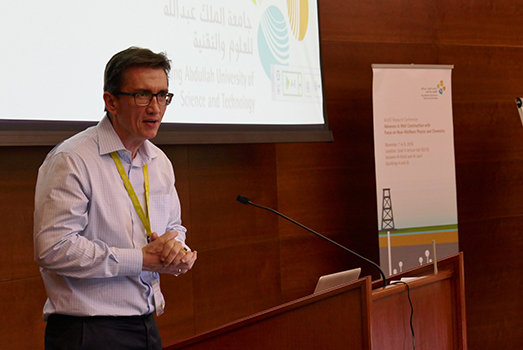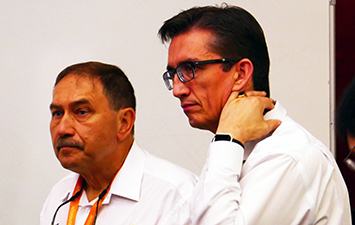Merchants in innovation

Eric van Oort, a professor in the Department of Petroleum and Geosystems Engineering at The University of Texas at Austin (UT Austin) and co-chair of the conference, speaks during the event. Photo by Karen Ramirez.
Tadeusz Patzek, director of the University’s Upstream Petroleum Engineering Research Center (UPERC), and Eric van Oort, a professor in the Department of Petroleum and Geosystems Engineering at The University of Texas at Austin (UT Austin), co-chaired the KAUST Research Conference: Advances in Well Construction with Focus on Near-Wellbore Physics and Chemistry from November 7 to 9 on the KAUST campus.
The conference centered on collaboration, breakout groups and discussion addressing core challenges among different experts from the petroleum industry and academia, including from major industrial partners like Saudi Aramco and Schlumberger, and different international universities.
Focus areas of the conference included well planning, drilling, navigation and completions; data quality analysis, improvements and standardization; data analysis and machine and statistical learning; model-based field/project control and automation systems; remote reservoir detection and reservoir fluid controls; and reservoir engineering and well performance modeling and analysis.

Tadeusz Patzek (left), director of the University’s Upstream Petroleum Engineering Research Center (UPERC), and Eric van Oort (center), a professor in the Department of Petroleum and Geosystems Engineering at The University of Texas at Austin (UT Austin), co-chaired the KAUST Research Conference: Advances in Well Construction with Focus on Near-Wellbore Physics and Chemistry from November 7 to 9. Photo by Karen Ramirez.
Radical change necessary in the industry
Patzek noted that $21 trillion is predicted to be spent on upstream and midstream oil and gas projects between 2015 and 2035. Oil projects and pipelines will consume $12.3 trillion, and gas projects, pipelines and liquefied natural gas terminals $8.8 trillion. Upstream spending will be 77 percent of total industry spending; midstream 13 percent; and refining 10 percent.“With the easy oil gone, industry is increasingly turning to unconventional oil and gas and frontier areas and the Arctic,” Patzek said. “To commercialize these opportunities as well as the unexploited conventional reserves, companies are increasingly engaging in multibillion dollar megaprojects. However, from 2014 to 2015, the oil and gas industry lost over $500 billion on project delays and project cost overruns before projects became operational.
“Business as usual simply will not do, and neither will arbitrary spending cuts,” he continued. “Our conference was designed to help the industry in radically changing how it operates.”
Future collaboration essential
The participants emphasized the theme of collaboration throughout their presentations and discussions, with van Oort noting, “To be successful in the challenge areas we’ve identified, you need the right expertise and the right skillset, plus some really great knowledge sharing upfront.”“We work in silos in this industry, and we also do this in academia. We must work together with physicists, geologists and petrophysicists to address current challenges,” added speaker Carlos Torres-Verdi, a professor in the Department of Petroleum and Geosystems Engineering at UT Austin.
Abdullah Al-Yami, a petroleum engineer from the Drilling Technology Team at Saudi Aramco’s EXPEC ARC research center, concurred, stating, “We drilling engineers also work in silos—we try to solve problems without looking at other specialties in drilling and we don’t pay attention to the other sciences. We want to solve our problems by ourselves, which is not possible.”

Conference attendees (left to right) Andrew Garnett, professor and director of the Centre for Coal Steam Gas at the University of Queensland (Australia); Nathan Zenero, director of GenesisRTS; Carlos Torres-Verdin, a professor in the Department of Petroleum and Geosystems Engineering at UT Austin; Eric van Oort, a professor in the Department of Petroleum and Geosystems Engineering at UT Austin; Arthur Berman, director of Labyrinth Consulting Services, Inc.; and Tadeusz Patzek, director of the University’s Upstream Petroleum Research Center, listen to small group presentations during the event. Photo by Karen Ramirez.
‘Merchants in innovation’
Van Oort noted that the industry still has far to go in the future. “Novel solutions are still required, and we have not solved every challenge yet, which is why a major theme of our conference is innovation and value. We are merchants in innovation—we have to develop ideas and sell them to people. We then need effective adoption of value-adding innovative technologies, but if you have great innovation, one major challenge we face is getting it into a conservative industry,” he said.Paradigm shift
“The time is now to rethink many of the paradigms we have lived through for the last 10 years,” Patzek said. “We need to now reflect and do more of what we have done, but do these things better and more simply.“Our conference refined, zoomed in on and bounced back a massive amount of information to come up with a vision of key research ideas that involve academia and industry. These ideas will hopefully result in high-quality academic research that is of interest to our academic and industry partners.”
“We hope we can elevate our ideas from the conference to a very high level, and that this will become a global approach to solving our identified challenges involving many different stakeholders,” van Oort added.
Related stories
-
Ph.D. student Wardana Saputra honored by Society of Petroleum Engineers
- By Caitlin Clark, KAUST News

